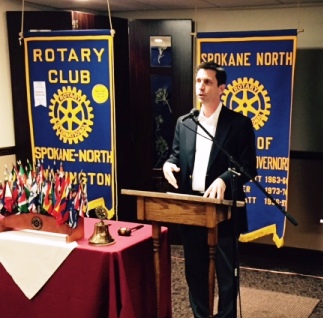Social Services In Spokane - Rob Crow
Posted
on Nov 30, 2015
Spokane North Notes
A weekly bulletin of the Spokane-North Rotary Club
November 30, 2015
Editors: Chuck Rehberg and Sandy Fink
Photo: Jim Minkler
Program coordinator: Brad Stark
Thanks from Glover: Kim Halcro, principal at Glover Middle School, wrote a very nice note of thanks to the club for its help for needy students and their families at Thanksgiving. At least six families were helped with club funds. Glover, at 2404 W. Longfellow, is where many Holmes Elementary students attend after their years at Holmes.
Shopping tags: Coordinator Melinda Keberle is distributing tags with wish lists for holiday gifts for needy Holmes students. Gifts are due no later than the Dec. 14 holiday luncheon at The Lincoln Center. Recommended expenditure is $35 for each student.
Sponsor reminder: While many businesses are still recovering from the windstorm damage, coordinator Jodi Harland reminds that sponsors are needed more than ever for the club’s annual fund-raising effort for projects at Holmes and other schools. Contacts now might facilitate sponsorships included in firms’ 2016 annual budgets. Contact Jodi for copies of the letters to corporate sponsors describing our projects.
Systemic, not simple, solutions sought for social services
Rob Crow likes to find long-term solutions rather than quick fixes to the social services needs of Spokane residents.
 Crow, senior manager at the city’s Community, Housing and Human Services (CHHS) Department, talked about the programs at the Nov. 30 club luncheon.
Crow, senior manager at the city’s Community, Housing and Human Services (CHHS) Department, talked about the programs at the Nov. 30 club luncheon. A City Council member from 2005-07, Crow talked to our club in December 2013 while he was director of Workforce Transitions at Spokane Falls Community College. His talk then focused on a service-learning effort in the West Central neighborhood, where Holmes Elementary is located.
Crow describes the city program’s efforts as a journey, not a series of quick stops. His agency distributes $14 million annually to social service programs.
“Just (temporarily) putting a roof over their head is not enough for the homeless,” he said. “We need permanent solutions, not just temporary ones.”
Crow adds: “We need to stimulate some thinking in broader perspectives – a system of solutions.”
He said Spokane County’s United Way has undergone a similar process of “focusing on more impactful results, not just spreading money (to programs and agencies) in the peanut -butter approach.”
While that “painful transition has been difficult for agencies not in alignment with that, the idea was to make an impactful difference in the community,” Crow said. “I think it was the right way to go.” As she closed the meeting, President Lenore Romney said our club has done the same thing, focusing on needy children in West Central neighborhoods.
As a systematic approach, Crow cited the example of cutting high-school drop-out rates. Rather than looking for fixes for upper-class students, he said the idea is to get every elementary school teacher to identify “key indicators that tie in to high school dropouts.”
Crow said while five-year plans required by the federal Housing and Urban Development Department focus on numbers reporting, “I’d rather get at how did I make a difference in their lives.”
He adds: “We could just be an ATM machine or we could identify gaps and redundancies and seek better results.”
For example, he said, giving food vouchers helps needy people short-term, but tying that to “learning about nutritional values and how to prepare the food” provides better long-term assistance.
In response to a question, Crow described Spokane as having “2 degrees of separation, not (the proverbial) 6 degrees.” He adds: “It’s a small city compared to the West Coast metropolises (he grew up in L.A.); but it’s a big city for its region (the Inland Northwest), so people look here for answers.”
“To get something done here, you have to know somebody,” Crow said. “The level of connectivity is more powerful than anywhere else I have been or know.”
And, he added, “We care more (for each other) than any community I’ve lived in.”
